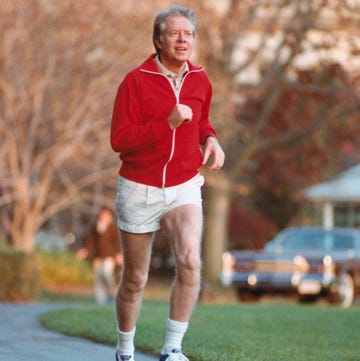Bryce Carlson doesn’t let his research confine him to a lab.
Instead, the professor of biological anthropology at Purdue University, whose race log includes nine 100-mile races and a 2:48 marathon PR, took his study on the road.
How to Start Running a charity that promotes physical activity for elementary school children. (Shoes & Gear.)
The 3,098-mile event started back in Huntington Beach, California, on January 16. Runners averaged about a marathon per day—some days were a little more than 26.2, a few were a little less—and they got a day off every time they entered a new state.
After 140 days, 117 marathons, and seven pairs of running shoes, Carlson finished the last stage of the race, 27 miles, in 3:39 and reached the White House on June 2.
His total accumulated time of 512 hours and 10 minutes earned him second place honors.
Robert Young, 32, from London, England, averaged 9:20 pace for the entire journey and won the race by a 30-hour margin over Carlson.
New Year Has High-Profile Pros Between Contracts 100 Mile Club, a charity that promotes physical activity for elementary school children.
Shoes & Gear.
“I wanted to use this run to study how humans adapt to environmental stresses,” Carlson told Runner’s World Newswire. “How does the body adjust to the stress of running a marathon almost every day for five months?”
To help answer that question, Carlson monitored his fellow competitors’ cardiovascular health, dietary, and sleep patterns.
The seven athletes who completed the race represented a range of ages and geographic backgrounds. The finishers included Alex Ramsey, 30, from Hawaii, who ran most of the route barefoot, and Newton Baker, a 73-year-old grandfather of three from Vermont.
And Carlson noted that the runners’ responses to the extreme physical challenge were just as diverse.
“Everyone went about the recovery process on a day to day basis in their own unique way,” he said. “It reinforces the point that whether you’re training for a 5K or a race across the country, there is no one-size-fits-all answer or secret.”
In the next few weeks, Carlson plans to send all the data he collected, from blood samples to food journals to gastrointestinal biomarkers, to a dozen colleagues at universities across the country. The research team includes two Boston Marathon medical directors and experts in the disciplines of physiology, sports psychology, and public health.
You don’t need a doctorate to understand Carlson’s plan after he returns to his home in Michigan on Saturday.
“Rest and more rest,” he said with a laugh.













